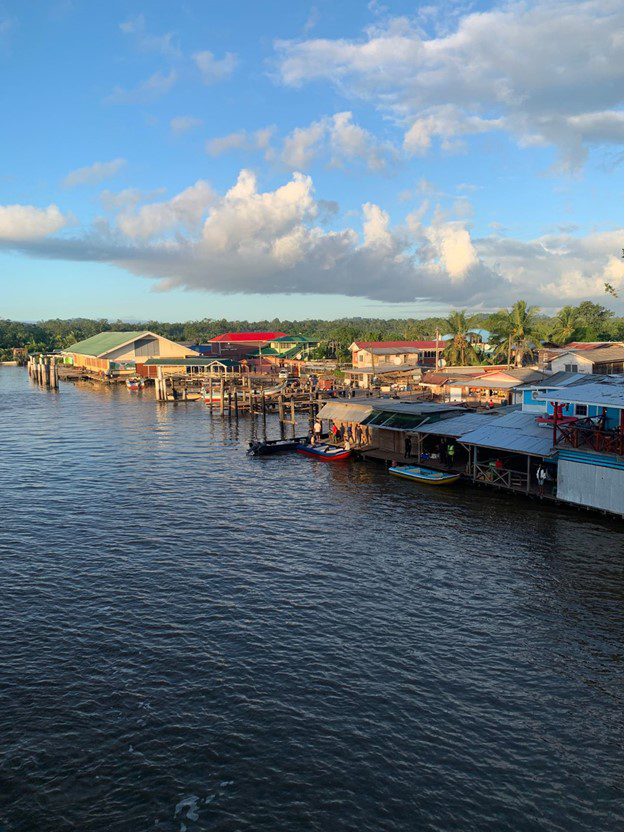Residents of Kumaka in the northwest say that the limited cargo space on the new ferry servicing the port is affecting them.
During a visit by Stabroek News to the area last week, complaints abounded regarding the MV Ma Lisha’s inability to accommodate the large volumes of produce required by businesses, with some traders even going as far as to express a preference for the older MV Kimbia, which they argue was more suited to the community’s needs. The problem, is contributing to the town’s high cost of living, they say. The India-financed MV Ma Lisha began servicing the area in August of 2023.
At the Kumaka Landing, shop owners, hucksters and tradespeople spoke at length about the challenges they face as they rely on the ferry system to deliver essential supplies to KMC Bond, Kumaka, Region One. SN understands that the MV Ma Lisha, despite its capacity to carry large quantities of goods, is not living up to the expectations of those who depend on it.
The vessel takes up to four days to load all its cargo, and for many in the area, the ferry’s seemingly limited space is hurting their cash flows. To put it into perspective according to the Ministry of Public Works, MV Kimbia’s gross tonnage is 848.27 tonnes and Net tonnage is 532.29 tonnes as compared to the MV Malisha’s gross tonnage which is 2054 tonnes and Net tonnage is 616 tonnes.
“Since this boat came, things have gotten worse. Things always leffing back in Georgetown, if you want to bring in goods, you need to make an online booking, and not everyone here can do that,” one local business owner shared with frustration. In October 2022, the Ministry of Public Works’ Transport and Harbours Department (T&HD) launched Guyana’s first online ticket booking system for water transport, ‘Ferry Pass’ which is aimed at utilizing the online service to ensure that persons can secure a place on the ferry; especially those who are traveling with vehicles. It will be used alongside the existing ferry system. According to a DPI article, priority is given to those who book online.
For many, the difficulties began when the MV Ma Lisha replaced the MV Kimbia. The latter was known for its cargo capacity, offering businesses the ability to transport larger quantities of goods to the region. In contrast, the MV Ma Lisha has been described as unsuitable for the type of produce that needs to be brought into the area.
“Soon it come here is stress from that day for us here till this day, this boat is not a cargo boat. It’s not shaped or prepared for the amount of produce we need to transport,” one trader lamented.
The issues with the ferry system are also tied to the monopolistic behaviour of certain large-scale businesses that prioritize their goods, leaving little to no space for smaller traders. “The big business owners get their things on the ferry first, and there’s no room left for our goods. Sometimes, we have to wait another week for our stuff to be brought up,” said another frustrated business owner.
As the town heavily depends on the goods transported via the ferry, the capacity of the MV Ma Lisha has created a ripple effect, inflating the cost of living. To compensate for the lack of available cargo space, many local businesses are turning to private boats. However, these smaller vessels can only transport a fraction of the goods needed, resulting in delays and increased costs.
“The small private boats can’t bring enough goods. Right now, I have to rely on them, but they can’t bring everything,” one local business owner explained. “Getting goods from Georgetown has always been a struggle, but since this new ferry came, it’s become even harder. The cost of living has gone up so much because of it.”
Many of the residents and businesspeople in Kumaka Landing are now urging for changes to the ferry system as the current state of cargo transportation to Kumaka Landing is a significant barrier to economic stability and growth in the region.
The MV Ma Lisha is worth some $2.5 billion and was constructed in India after a contract was signed between the Transport and Harbours Department (T&HD), Guyana, and Indian company, Garden Reach Shipbuilders and Engineers Limited back in January 2021. The government was able to fund the acquisition of the vessel via a loan/grant it obtained from the Indian government.










